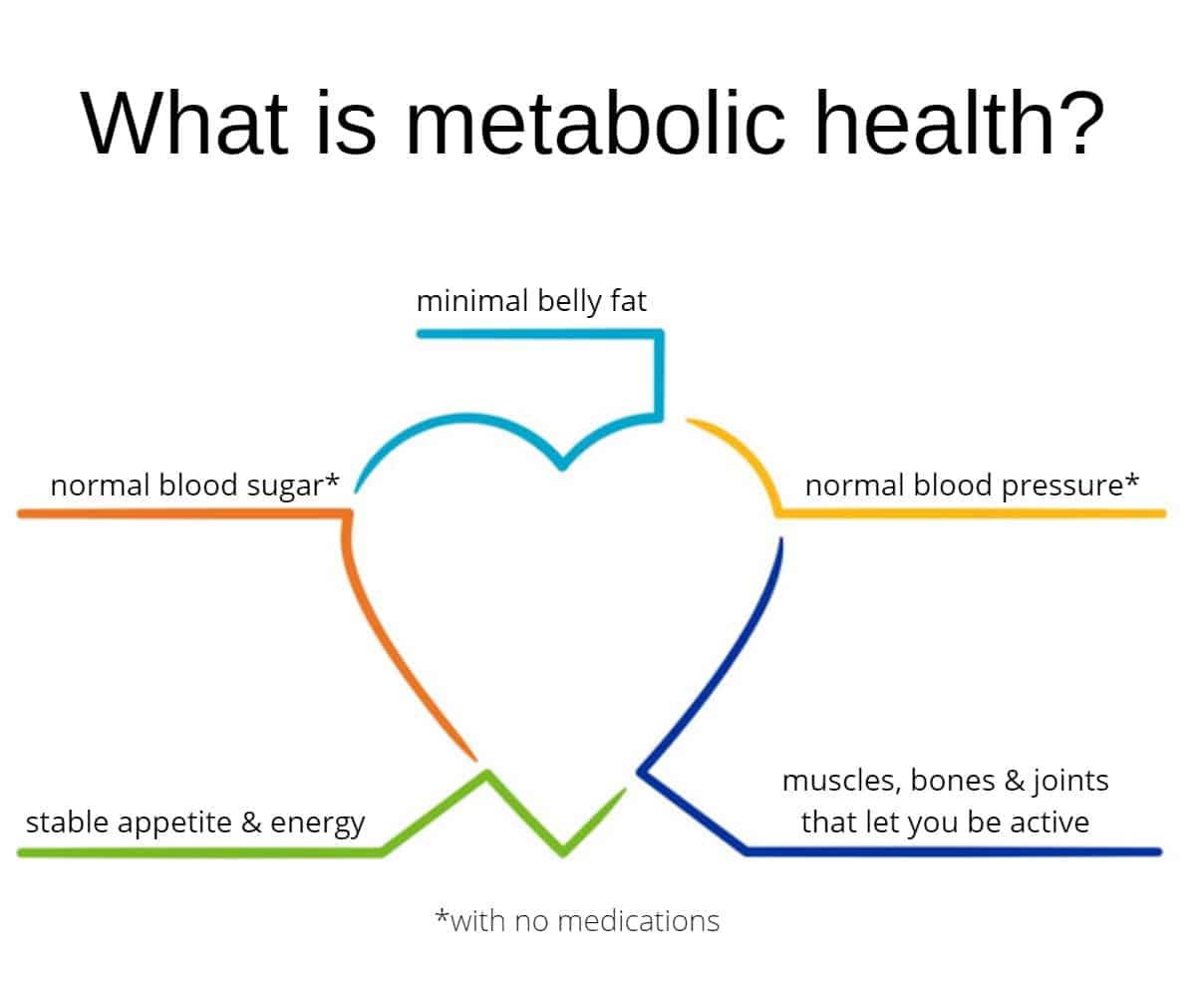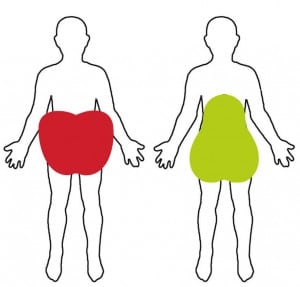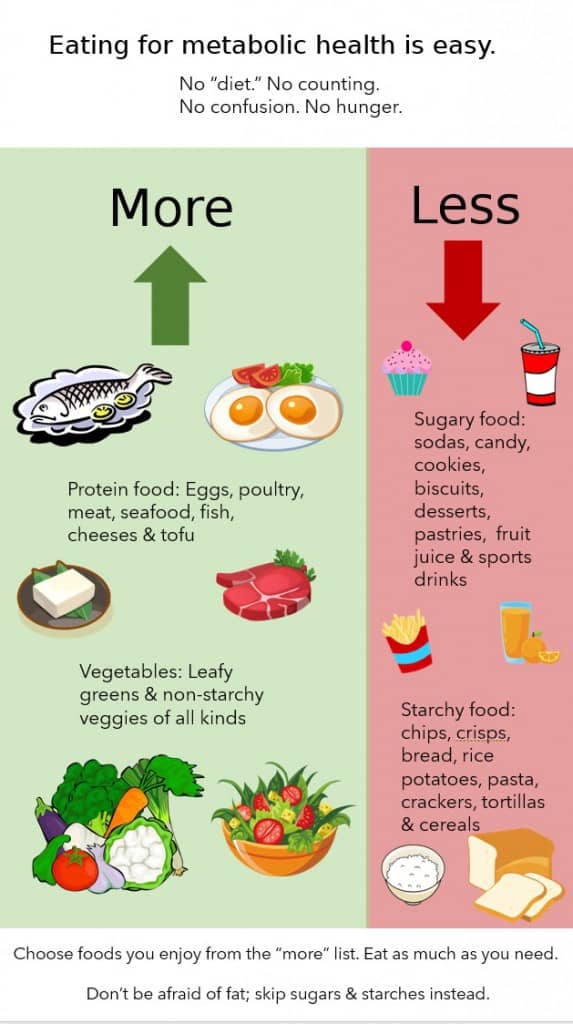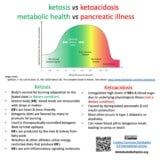What is metabolic health? In plain language.
Do you want to know if you are metabolically healthy? It’s an easy question to answer, even without a visit to your doctor’s office.
In layperson terms, metabolic health has 5 parts: minimal belly fat, normal blood sugar*, stable appetite and energy, muscles, bones & joints that let you be active, and normal blood pressure*. *These should be achieved without medications.
1. Do you have a lot of belly fat?
If you have a tape measure or even a piece of string, you can find out one of the most important things to know about metabolic health: whether you have abdominal obesity.
Abdominal obesity – also called central obesity, visceral obesity, a “beer belly,” or a “food baby” – is when your belly is bigger than it should be relative to the rest of you. This is a sign that fat is accumulating in and around your body’s vital organs – which can negatively impact your metabolic health.
If your waist circumference is greater than 102 cm (or 40 in) if you’re a man, or greater than 88 cm (35 in) if you are a woman, you may have abdominal obesity.

Abdominal obesity is different from having a high BMI, although if you have a high BMI, you often will also have a big waist circumference. However, it’s usually easy to tell if your body’s fat patterns make you a “pear” shape or an “apple” shape.
In terms of being metabolically healthy, a “pear” shape is better. An “apple” shape indicates that your body is rapidly storing excess energy in your belly area, to keep it out of your bloodstream. This fat accumulates in and around your liver and other internal organs, which interferes with their ability to work properly.
If you have abdominal obesity, you may need to take some steps to help your body get rid of the excess fat around your middle.
2. Are you on blood sugar medications?
Having normal blood sugar is usually a sign of good metabolic health.
If you are not on any medication to keep your blood sugar down, that’s a great start. But if you haven’t had your blood sugar measured in a while, you should be sure to have that checked at your next visit to a healthcare provider.
There are also inexpensive devices called glucometers that let you measure blood sugar at home. Find out how to measure your blood sugar at home, and what the results mean.
If you are checking your blood sugar at home, do it first thing in the morning, before you eat. It should be below 110 mg.dL (6.1 mmol/L). Otherwise, you may need to take some steps to bring your blood sugar back down to a healthy level.
3. Are you on blood pressure medications?
Having normal blood pressure is often another sign of good metabolic health.
If you are not currently on any blood pressure medications, that’s also a great start. But, like blood sugar, if you haven’t had your blood pressure measured in a while, you should be sure to have that checked at your next visit to a healthcare provider.
There are also blood pressure monitors that let you measure your blood pressure at home. These are not as inexpensive as glucometers, but some are priced more reasonably than others.
This article can help find out what your blood pressure numbers mean, and if you need to be concerned about having high blood pressure.
If you check your blood pressure at home, both numbers should be below 130/85 mmHg. Otherwise, you may need to take some steps to bring your blood pressure back down to a healthy level.
4. Are your appetite and energy levels up and down all day?
Good metabolic health isn’t just about numbers, it’s also about how you feel every day.
If you can go through the day without thinking about food or having to stop to eat every hour or so, that’s a good indication of metabolic health. It means that your body can access it’s stored energy when it needs to. That way, you don’t get overly “hangry” (hungry + angry) when you aren’t eating almost constantly.
And if your energy levels stay constant throughout the day, that’s also a good sign – for the same reason.
But if you feel the need to eat often, you think about food constantly, or you find yourself drowsy and unable to focus during the day – especially not long after meals – this may indicate that your body is having trouble getting a stable supply of energy.
Usually your body can easily access stored energy – also called body fat – when it needs to, especially between meals. This keeps us from having to eat all the time and from having energy “slumps.”
If your appetite and energy levels aren’t stable, there are some simple lifestyle interventions that can help you improve both of these, so you can go through your day without worrying about hunger or energy slumps.
5. Are your muscles, bones, and joints tired, weak, and achy?
We often think that aching joints and weak muscles and bones are just a normal part of aging. But they don’t have to be.
If your muscles, bones, and joints are strong and pain-free, that’s yet another sign of good metabolic health. This indicates that you are doing at least two things right:
First, you are feeding your body the things it needs to grow muscle and bone, namely protein-rich foods such as fish, meat, dairy, and legumes. Second, you aren’t eating too many of the foods that help cause inflammation, which can lead to painful, achy joints. These are foods that have a lot of refined sugars, starches, fats, and oils.
We don’t often think that eating too many of these foods has consequences besides weight gain. But they can rob us of our metabolic health as well.
Are you in good metabolic health?
If you answered no to all of the above questions, you are very likely to be in good metabolic health. Congratulations! We want to help you stay that way.
If you answered yes to one or more of the above questions, you may be losing your metabolic health. But don’t worry. A few simple changes to your diet and lifestyle can restore metabolic health in a fairly short time.
No, this does not necessarily mean going on a diet or losing a lot of weight. You can improve your metabolic health by making small, but important, changes in how you eat that will help your body get rid of the fat that is most dangerous to your health – the fat around your middle.

Other useful metabolic health definitions
From Doctor’s Campbell Murdoch, MD and Peter Bagshaw, MD.

As a doctor I see the result of poor metabolic health every day. Poor metabolic health is often ignored in healthcare, but it is preventable and improvable. It is a key challenge and opportunity of our time. But what is metabolic health?
Dr. Campbell Murdoch, MD via Twitter & LinkedIN
This is a very important message In my professional lifetime it has taken over from smoking as the main preventable cause of I’ll health and premature death
Dr. Peter Bagshaw, MD via Twitter
A biochemist’s definition of metabolic health is quite different.
In contrast to layperson definitions, scientists need more precise definitions. For example, in research they need measurable criteria to establish who does or does not meet them.
Success stories from the our team
- Metabolic Multipliers
- Captain Malagon
- Cecile’s
- Nurse Christie – My mother’s suffering spurred me to find keto










